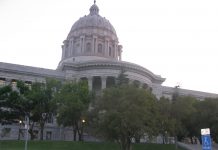Photo Credit: Global Diaspora News (www.GlobalDiasporaNews.com).
Minister in the Presidency, Khumbudzo Ntshavheni, says the mandate given to political parties by South Africans following the general elections is a mandate that all South Africans must act on to create a better South Africa.
The Minister said this when she was delivering the Government Communication and Information System (GCIS) Budget Vote in Parliament on Friday morning.
This year’s general election results produced no outright majority winner – tasking various political leaders to work together to form a Government of National Unity (GNU), much like what was required at the dawn of democracy in 1994.
Some 11 political parties are part of the GNU with leaders from some of those political formations appointed as Ministers and Deputy Ministers.
“The historic mandate which we are granted to be the seventh administration and the seventh parliament is not confined to political parties. But this is a national effort in which all South Africans must participate as each of us acts to create the South Africa in which we wish to live, raise our children and exercise our economic skills following the general elections.
“This mandate must build on the great strides we have made since 1994 as reflected in the Census 2022 results which paints a picture of a society on the move and which reflects improvements across most indicators despite the challenges confronting us,” she said.
The Minister explained that the GCIS will “dedicate its expertise and resources to supporting the work of the Government of National Unity so that we can provide South Africans and our partners with information that can help us to move forward as a country”.
“Our first task, as the country navigates these unchartered waters is to educate citizens about the establishment of the seventh administration which, in its current form, is unprecedented in the history of our democracy.
“As part of the new administration and with an equally inclusive cohort of communication professionals, GCIS will spearhead a well functioning communication system that prioritises informed and empowered citizens,” she said.
Ntshavheni acknowledged that the task before the department is a “mammoth one”.
The budget allocation for the GCIS over the three years of the Medium Term Expenditure Framework (MTEF) amounts to some R2.3 billion.
“In the coming period, the GCIS will have to be at the forefront of engaging citizens on the work of government with emphasis on mobilising all of society to be part of the unity and change and progress in our country.
“This moment in our history is one for all South Africans to make their voices heard and their actions seen and felt across society,” she said.
Ntshavheni laid out some of the plans the department will embark on to ensure that every citizen has access to information.
“GCIS has put forward bold and decisive plans to use the strong communications system it has developed over the years to ensure that South Africans remain abreast of key developments that take place within the country.
“The department will…use communication to help citizens across the length and breadth of our nation to participate in and enjoy the benefits of our hard won democracy and freedom. It will share critical information on government services and programmes as well as create opportunities to open the economy to more South Africans,” she said.
The Minister revealed that one of the tasks that the government-wide communication system has is to rebuild “trust between citizens and the government the nation has put in place”.
She added that the department will also be tasked with motivating South Africans to “replace cynicism, suspicion and despondency with active citizenship, social investment and confidence in our future”.
Turning to the gains of the past 30 years of democracy, Ntshavheni emphasised that the developments seen across South Africa since 1994 are “not by chance” but are as a result of concerted government programmes and effort.
“Today millions of households have access to housing, water, sanitation and electricity when compared to 1994.
“Our policies have facilitated the greater economic transformation and the empowerment of previously disadvantaged individuals.
“We have introduced laws and policies on worker rights, employment equity and broad based black empowerment. There has been strong investment in infrastructure, public employment programmes and achieving higher levels of economic growth; but the challenges remain.
“This is a journey that has had and will have many facets into the future,” she said. – SAnews.gov.za
Source of original article: (www.sanews.gov.za).
The content of this article does not necessarily reflect the views or opinion of Global Diaspora News (www.GlobalDiasporaNews.com).
To submit your press release: (https://www.GlobalDiasporaNews.com/pr).
To advertise on Global Diaspora News: (www.GlobalDiasporaNews.com/ads).
Sign up to Global Diaspora News newsletter (https://www.GlobalDiasporaNews.com/newsletter/) to start receiving updates and opportunities directly in your email inbox for free.































